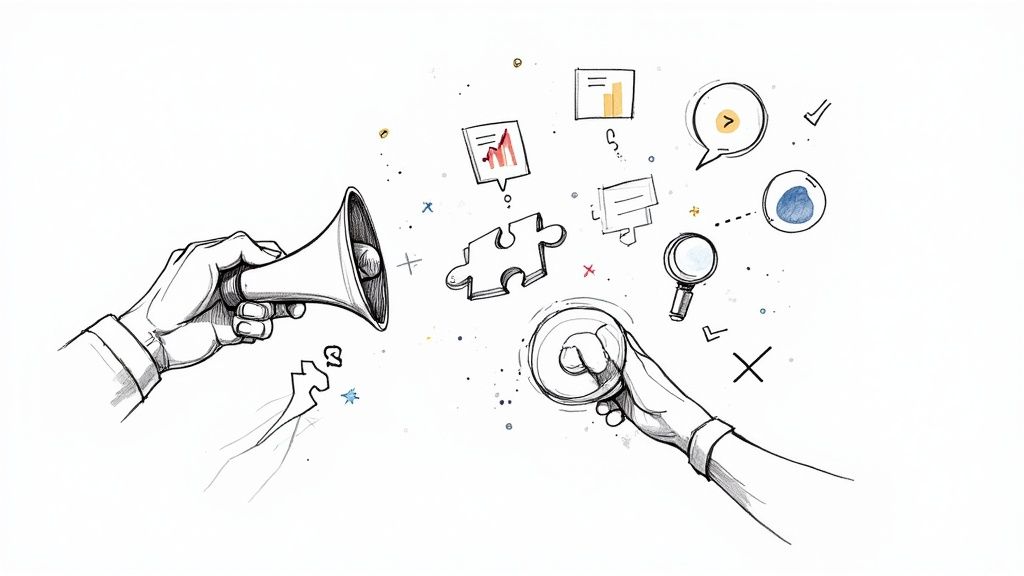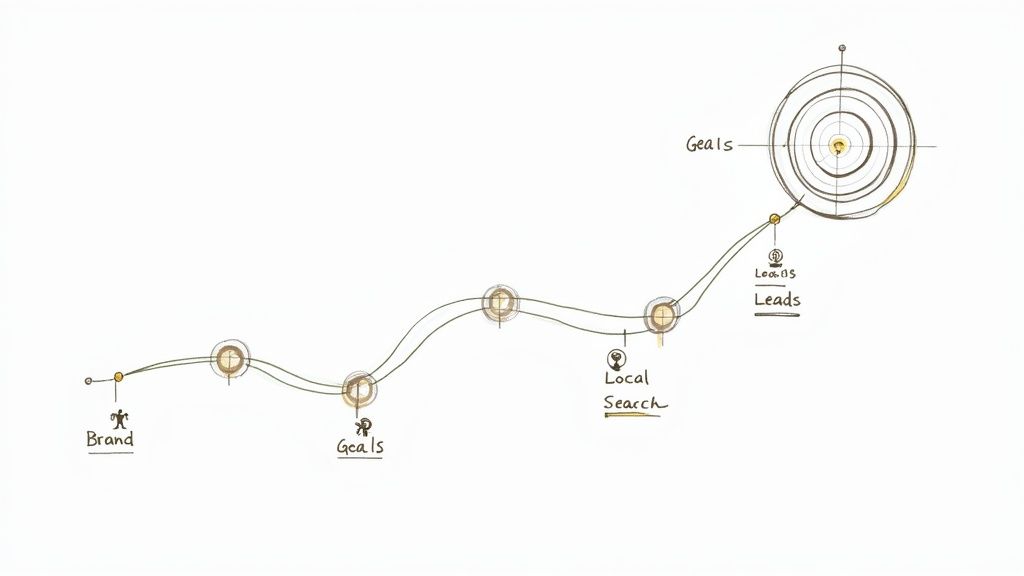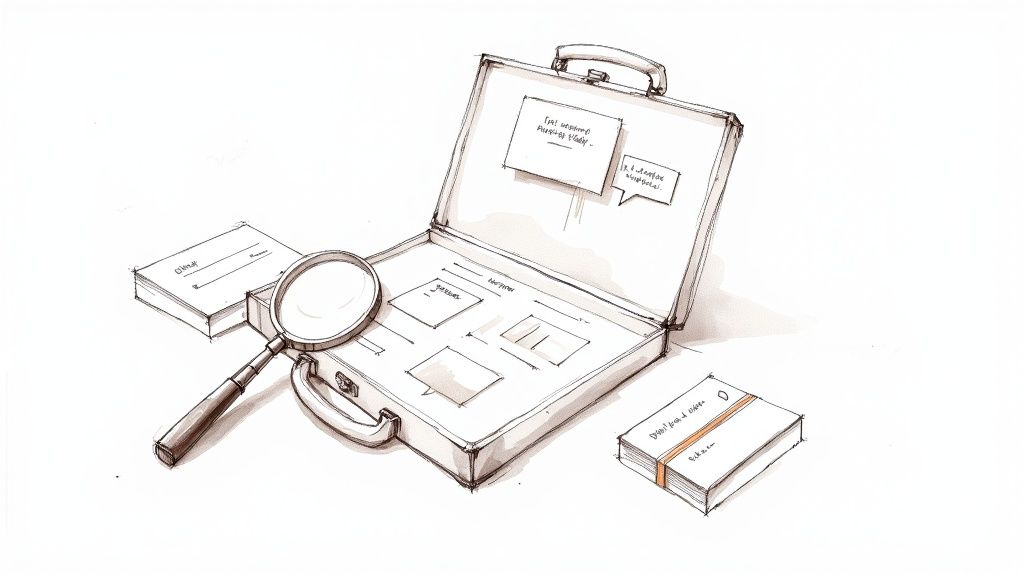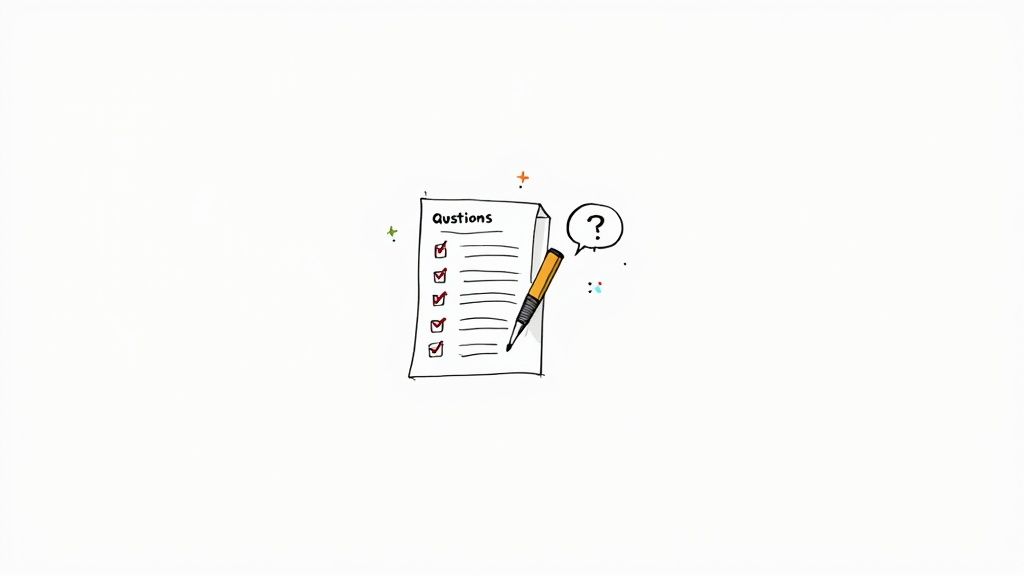
Streamline Your Workflow: The Ultimate Guide to Automated Client Reporting in 2026
Master automated client reporting in 2026. Our guide covers AI, implementation, and cost-effectiveness for agencies. Streamline your workflow today!

Finding the right marketing agency isn't just about scrolling through endless websites. It starts with a hard look in the mirror. You have to get crystal clear on your own business goals before you can find a partner who can help you hit them.
Frankly, success depends entirely on this internal clarity before you even start your external search.

Before you book a single discovery call, the most critical work happens inside your own walls. A great agency partnership is built on a solid foundation: a deep understanding of what you actually need to accomplish. Without a destination in mind, any road will do—and that's a surefire way to burn through your marketing budget with nothing to show for it.
The first step is to turn broad business ambitions into specific, measurable marketing goals. "Growing the business" is a nice thought, but it’s not a goal. A real goal is something you can track and measure.
For example, a software company aiming for more market share could set a marketing goal of generating 500 qualified leads per month. An e-commerce brand wanting to boost revenue might target a 15% increase in conversion rate next quarter. See the difference?
Having clearly defined Key Performance Indicators (KPIs) from the get-go is non-negotiable. It's the only real way to hold an agency accountable and ensure everyone is pulling in the same direction.
This initial homework becomes your North Star for the entire selection process. It gives you a filter to immediately weed out agencies that don't have the right expertise and laser-focus on the ones that do. More importantly, it lets you have meaningful conversations about strategy, not just tactics.
You need a plan for tracking progress. Knowing how to measure your marketing ROI is essential, and it's something to think about long before signing a contract. For instance, if search is part of your plan, you need to understand how to effectively measure SEO ROI to gauge an agency's real impact.
This table shows how to connect high-level business goals to the marketing metrics that matter.
A simple guide to help you turn high-level business needs into measurable marketing outcomes.
Using a framework like this transforms vague ambitions into an actionable scorecard, making it easier to find an agency partner equipped to deliver the results you need.

You’ve nailed down what you want to achieve. Now for the hard part: finding an agency that’s been in the trenches of your industry. A generalist firm might sound impressive, but you need a partner who already speaks your customer's language and understands the quirks of your market. Forget the slick sales pitch; you're looking for proof.
Globally, there are around 450,000 businesses calling themselves advertising agencies. With so much noise, specialization is everything. It separates an agency that gets by from one that will genuinely move the needle for your business.
When digging into potential agencies, go straight to their case studies. But don't just glance at the headlines. Look for real business outcomes, not fluffy vanity metrics like a jump in impressions. What matters are the numbers that hit your bottom line: leads, sales, and customer retention.
For an e-commerce store, you should be asking for proof of results like:
Those are the results that actually grow a business.
A top-tier agency won't just throw numbers at you; they'll walk you through the how and why. They should be able to break down the exact strategy they used and the hurdles they cleared.
You can often spot true expertise by looking at the agency's own content. Are they publishing genuinely helpful articles or webinars that tackle real-world industry problems? This shows they’re not just selling a service; they live and breathe this stuff. This focus on evidence helps you find a data-driven marketing agency that knows how to deliver.
It's time for the money talk. Being clear on your budget right away is crucial when looking for an agency. It saves everyone time and starts the relationship on the right foot. Think of your budget not as a constraint, but as a strategic guide to find a partner who can deliver results you can afford.
This conversation is also your first peek into how an agency operates. You'll encounter different pricing models, like monthly retainers for ongoing support, project-based fees for one-off campaigns, or performance-based models where they get paid when you see results. Understanding them helps you figure out what makes sense for your business.
So, what are you paying for? A big chunk is the team's expertise. It's helpful to get a sense of the market rate for the talent you're renting. Checking typical Paid Media specialist salaries can give you context and a better appreciation for their pricing.
A good agency will never be cagey about costs. If they can't give you a clear, straightforward breakdown of where every dollar is going, that’s a huge red flag. Transparency is non-negotiable.
Having a solid budget also sharpens your focus. With studies showing that companies, on average, put 7.7% of their total revenue into marketing—and 51% of that dedicated to paid media and technology—you need a partner who makes that investment count.
If you want an agency with real skin in the game, look into what a performance-based marketing agency can offer. Their success is literally tied to yours.

A partnership's success often comes down to more than just skill. It’s about the people and the process. These "soft skills"—how an agency communicates and collaborates—can make or break your entire experience. Remember, you aren't just hiring a vendor; you're integrating an outside team into your business.
Their communication style should feel like a natural extension of your own. Do they proactively share updates, or do you find yourself constantly chasing them for information? A great partner anticipates your needs and flags issues before they become problems.
When talking to potential agencies, look for a clear, well-defined process. You should know from day one who your point of contact is and how often you can expect to hear from them.
Ask yourself a few key questions:
A strong cultural fit means finding a team that mirrors your company's values and work ethic. This alignment is the glue that holds the relationship together, especially when you need to pivot your strategy.
The marketing agency world is booming, with a global value projected to reach $386.36 billion by 2025. This growth gives you more choices but makes it crucial to find an agency skilled with modern analytics and automation that can deliver the data-driven results you’re paying for. You can learn more about the growth of the marketing industry at mycodelesswebsite.com.

You’ve narrowed your list to a few serious contenders. Now, it's time to go deep. This is where you move past the slick presentations to truly understand how these agencies operate. This final Q&A stage is your best shot at finding a genuine partner who thinks strategically, not just a vendor who executes tasks.
It's easy to be impressed by case studies. The real test is seeing how they think on their feet. Throw them a hypothetical challenge your business might face.
For example, ask them: "Let's say our lead volume suddenly tanks by 30% next month. What are the first three things you would do to figure out what's wrong and get us back on track?" Their answer will tell you everything about their problem-solving process.
Another key area to probe is how they handle a campaign that isn't working. Not every idea is a home run. You need to know they can pivot without getting defensive.
An agency’s response to underperformance is a massive tell. A great partner won’t make excuses; they'll present a data-backed plan for what they're changing and why. They see it as a puzzle to solve, not a failure to hide.
This is also the time to get clear on how they report on ROI. Ask them to share a sanitized report from a similar client and walk you through it. This shows if their reporting is transparent and focuses on metrics that drive your business forward.
To make sure you cover all your bases, use this checklist before you sign on the dotted line.
Using these questions will help you compare agencies and make a decision based on substance, not just a great sales pitch.
Even after all your homework, a few questions usually bubble up. Let's walk through some of the most common ones so you can feel confident in your final decision.
The honest answer is: it depends on the strategy. You're building a fire, not flipping a light switch.
A good agency will set realistic expectations from the get-go with a clear timeline.
A huge red flag is any agency that promises instant or #1 results. Real marketing is a marathon of testing and refining—it's not a magic trick.
This boils down to the problem you're trying to solve. There’s no single "better" option, just what's better for your business right now.
A specialist agency brings deep, focused expertise in one area, like technical SEO or B2B content marketing. They’re agile and laser-focused, perfect for a complex challenge.
A large full-service agency is a one-stop shop for everything—branding, PR, social media, web development. This is ideal for big, integrated campaigns or a total marketing makeover.
Besides impossible guarantees, watch for other warning signs. If an agency is cagey about providing client references or won't give a straight answer on pricing, that’s a hard pass. High-pressure sales tactics are another giveaway.
But the biggest red flag? A one-size-fits-all pitch. If a potential partner tries to shoehorn you into a generic package without asking deep questions about your business, customers, and unique goals, they aren't the strategic partner you need to grow. Run.
At BrandBooster.ai, we blend human expertise with AI-driven insights to build marketing strategies that get real, measurable outcomes. We're so confident in our process that we guarantee you'll see a return on your ad spend in 60 days, or you don't pay. Learn more and book your free audit at https://www.brandbooster.ai.